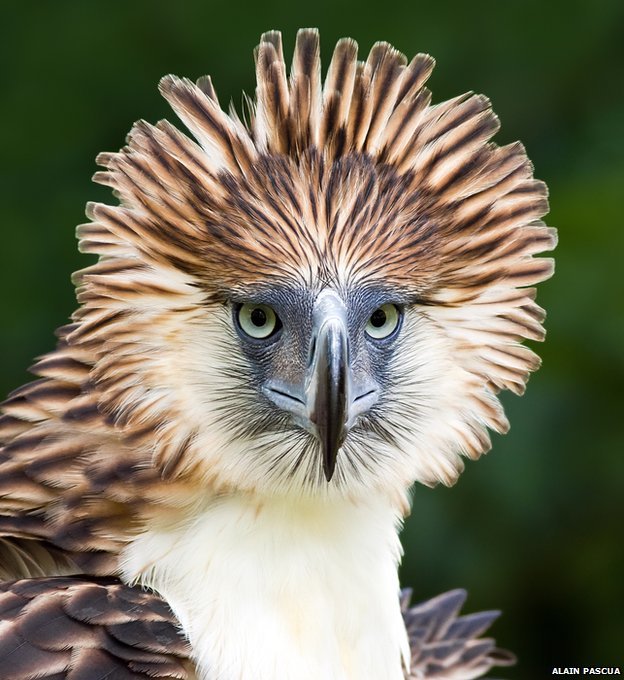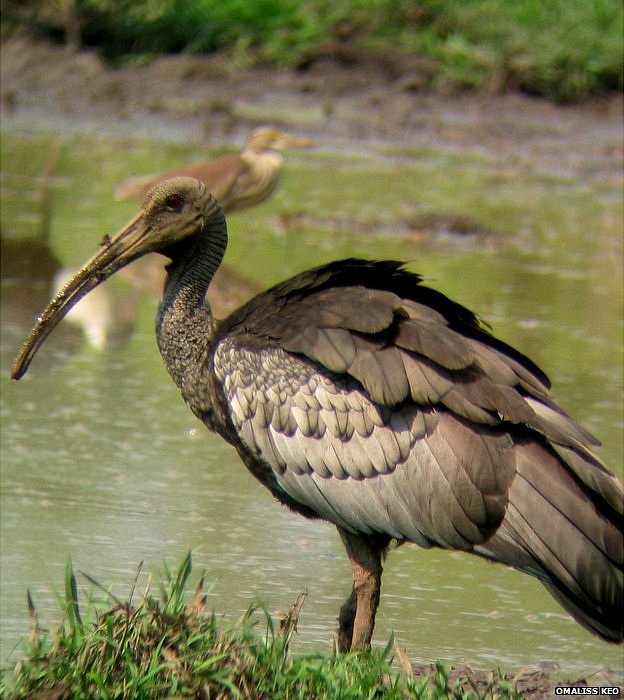2014 Rarest Birds
The 100 most distinct and rare birds
Philippine's eagle: The Philippine's eagle is at number eight

The world's 100 most distinctive and endangered birds have been determined.
Scientists in the UK and US chose the birds based on their rarity, but also how distinctive their appearance, behaviour and evolutionary history was.
The list of birds contains several of the world's largest and most striking, as well as other unusual species threatened with extinction.
Included are the tooth-billed pigeon, known as the little dodo, the Philippine's eagle and a type of kiwi.
Scientists at the Zoological Society of London (ZSL), UK and Yale University in New Haven, Connecticut, US created the list as part of the EDGE of Existence programme, which seeks to document the most uniquely vulnerable species on the planet.
Details of the exercise are published in the journal Current Biology.

Giant ibis. The giant ibis stands tall at the top of the list
At number one is a bird called the giant ibis.
The largest member of the ibis and spoonbill family, the giant ibis stands over a metre tall, weighs 4.2kg and is the national bird of Cambodia. Despite this, fewer than 230 pairs remain.
As well as being more distantly related to other members of its family, the giant ibis is expected to further decline in numbers due to habitat destruction and the predation of its eggs by mammals.

New Caledonian owlet-nightjar: ZSL EDGE (illustration by Joseph Smit in the journal The Ibis - 4th Series Volume 5, 1881) The New Caledonian owlet-nightjar is said to have longer legs than other owlet-nightjars
At number two is the New Caledonian owlet-nightjar.
With only two specimens and a small number of sightings, little is known about this enigmatic species, which has not been seen since 1998.
It continues to elude birdwatchers and researchers, with fewer than 50 assumed to survive.

Californian condor:A Californian condor flies in near the top of the list
At number three is the Californian condor, a bird with a three-metre wide wingspan that has been the subject of intensive conservation efforts.
Exactly how many Californian condors once lived remains unknown, yet by 1981 the wild population numbered just 21 birds.
Despite numerous breeding efforts since that time, a chick did not hatch again in the wild until 2003.

Kakapo: The kakapo rarely emerges in sunlight
At number four is the New Zealand kakapo, a flightless, nocturnal bird that is the heaviest of all parrots.
It is now extinct throughout its natural range, and survives only on three small, intensively managed islands.
Dedicated conservation efforts have seen the population increase slowly to 125 individuals.

Kagu: The kagu has a large crest, long legs, and a peculiar 'bark', which can be heard over a mile away
And at number five, the kagu, a bird endemic to Grand Terre, the largest island of New Caledonia.
Another highly unusual, almost flightless bird, due to its startling ash-white plumage, the kagu is known locally as the 'ghost of the forest'.
It is the only representative of an entire taxonomic group, resembling something between a small heron and a rail.
Also on the list are 95 other unique species, such as the Forest owlet, thought to be extinct until its rediscovery in 1997, almost 113 years after the last confirmed record, the Christmas Island frigate bird, and the tooth-billed pigeon, a bird thought extinct for most of a decade, until it was recently photographed.
Lead author Prof Walter Jetz from Yale University and Imperial College London, said: "These highly distinct and endangered birds often occur far away from places that are species-rich or are already on conservation's radar."
"Half of the 100 highest ranked EDGE bird species are receiving little or no conservation attention," added Carly Waterman, EDGE Programme Manager at ZSL.
"We lament the extinction of the dodo, but without action we stand to lose one of its closest relatives, the tooth-billed pigeon or 'little dodo', and many other extraordinary birds."





Recent comments